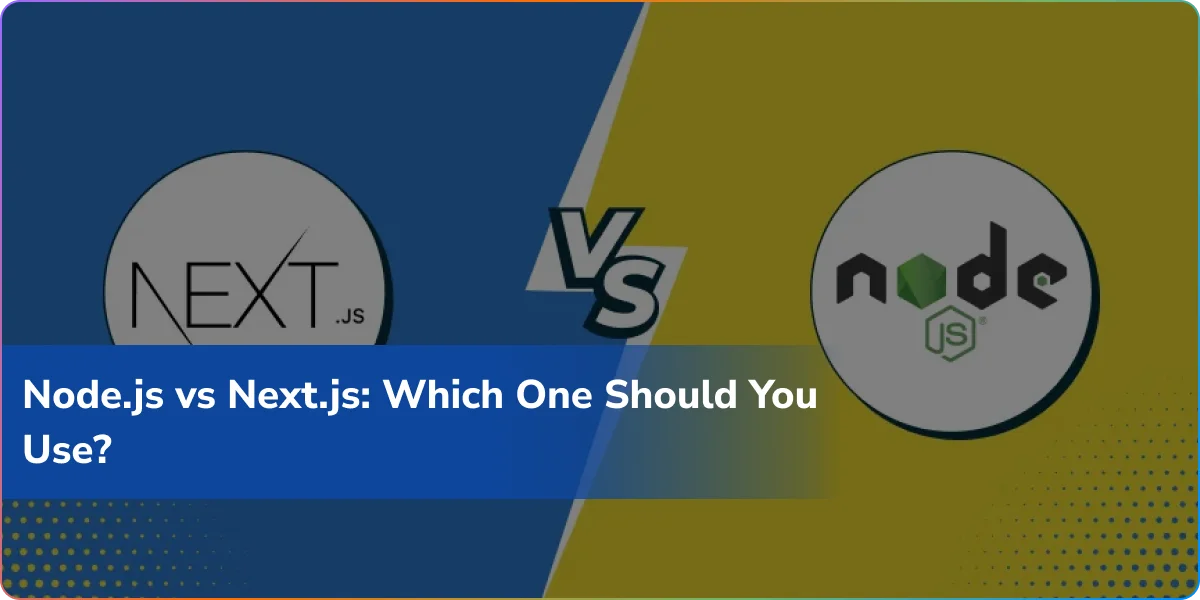While creating modern web applications, developers generally face this question: Next js vs Node js – what do I choose? Both are mainstream, robust, and mainstream technologies but serve different purposes in the world of software development. To make the right decision for your project, you need to know their purposes, functionality, and differences.
Here, we are going to discuss Next js vs Node js and understand how they are used in various scenarios. We are also going to discuss the difference between Node js and JavaScript, clarify if Node.js is a library or a framework, and discuss Next js vs Express and Node js vs JS.
By the end, you will know which tool fits your project best.
What is Node.js?
Let’s begin with Node.js before jumping to next js vs node js
Node.js is an open-source, cross-platform runtime environment that enables developers to execute JavaScript outside the browser. JavaScript was used to develop front-end scripts traditionally, but Node.js has made it possible to use JavaScript on the server side too.
Key Features of Node.js:
- Typed on Chrome’s V8 engine for quick performance.
- Non-blocking and event-driven I/O for scalability.
- Supports the creation of APIs, real-time apps, and microservices.
- Enormous NPM (Node Package Manager) library ecosystem.
Common Use Cases:
- REST services and backend APIs.
- Real-time chat applications.
- Streaming applications (like Netflix).
- Microservices and e-commerce backends.
Node js is library or framework?
Most beginners wonder: Node js is library or framework? The reply is – neither. Node.js is actually a runtime environment. It provides a platform for running JavaScript on the server but not a framework or library itself.
What is Next.js?
Next one in the node next world is Next.js.
Next.js is a React framework for building modern, fast, and scalable web applications. While React is a library for building user interfaces, Next.js adds on top of it with solid features like server-side rendering (SSR), static site generation (SSG), API routes, and image optimization.
Top Features of Next.js:
- Static site generation and server-side rendering to enhance SEO.
- File-based routing system.
- Integrated API routes to build backend endpoints.
- High-performance with automatic code splitting and image optimization.
- Full-stack development using React.
Common Use Cases:
- Search engine optimization sites.
- Blogs and content-heavy applications.
- E-commerce frontends.
- SaaS dashboards and business portals.
Node js vs Next js: The Basic Difference
Now you may wonder, what’s node js and javascript, and how is it related to Next.js? Let’s break it up.
- JavaScript is an implementation language.
- Node.js is a runtime environment where you can run JavaScript on servers.
- Next.js is a framework built on React (which is itself a library for building UI).
So, the difference between node js and javascript is that JavaScript is the language itself, while Node.js forces you to use that language beyond the browser. Next.js, however, is a frontend + full-stack specific framework for React.
In short:
- Use Node.js for backend and server-side programming.
- Use Next.js for frontend or full-stack projects that involve React and SEO capabilities.
Comparing Next.js vs Node.js in Depth
Let us dive deeper into node js vs next js by feature, benefit, and application comparison.
- Purpose
- Node.js: Backend runtime environment.
- Next.js: Complete-stack React framework to create UI + frontend applications with SSR/SSG.
- Performance
- Node.js: Highly scalable with non-blocking I/O, suitable for APIs and real-time applications.
- Next.js: Provides server-rendering, which improves performance and SEO for web applications.
- Learning Curve
- Node.js: Requires an understanding of backend principles, REST APIs, databases.
- Next.js: Simpler if you’re already familiar with React. Targets frontend + SSR.
- Use Cases
- Node.js: Chat applications, video streaming, backend services.
- Next.js: SEO sites, blogs, e-commerce frontends.
Next js vs Express
When next js vs express is compared, keep in mind that they are designed to solve different problems.
- Express.js is a light-weight backend framework for Node.js. It’s utilized for creating APIs and server-side logic.
- Next.js is frontend-centric, but it does have API routes (a lightweight replacement for Express).
If your application needs a full-fledged backend, then Express instead of Node.js is preferable. But if you need a frontend application with some API routes, Next.js can replace Express for small backends.
Node Next: Using Them Together
Instead of Node.js or Next.js, both are used in most projects. Together, the procedure is referred to as node next development.
Here is the way it works:
- The backend (business logic, APIs, authentication, databases) is handled by Node.js.
- The frontend (UI, SEO, rendering) is handled by Next.js.
This way, the best of both worlds is achieved: a scalable backend and a fast, optimized frontend.
React JS and Node JS Difference
Since Next.js is built on React, it’s useful to cover the react js and node js difference.
- React.js: A frontend library for building UI components. Runs in the browser.
- Node.js: A runtime for the server to execute JavaScript on the backend.
Whereas React will be used to build what the user experiences, Node.js will be used to build what happens in the background. Both of them enable full-stack JavaScript development.
Difference Between React and Node js
Another common confusion is difference between react and node js. Let’s simplify it:
- React: Empowers developers to create interactive UI with components that can be reused.
- Node.js: Empowers the environment to run JavaScript outside a web browser and handle backend processes.
Thus, while React is frontend only, Node.js is backend only. Next.js bridges both worlds by using React for frontend and offering server-side capabilities like APIs.
Node js vs JS
Another quite similar question is node js vs js.
- JavaScript (JS): A natively executable language within browsers.
- Node.js: An environment which supports JavaScript execution outside the browser, especially for backend programming.
So, for purely client-side development, JS is enough. For backend services, Node.js is needed.
When to Use Node.js?
Use Node.js when your project demands:
- High-performance backend APIs.
- Real-time features (chats, notifications).
- Scaled microservices architecture.
- Heavy server-side logic.
Examples: Netflix’s backend, LinkedIn server, Uber’s live tracking.
When to Use Next.js?
Utilize Next.js when your app demands:
- SEO-optimized websites.
- Static site generation or server-side rendering.
- E-commerce websites with performance optimization.
- React-based UI and simple routing.
Examples: E-commerce sites, marketing sites, blogs, SaaS dashboards.
Which One Should You Use?
So, next js vs node js isn’t really a race – it’s about use. If you require a backend service, then use Node.js. If you require a React-based frontend with great performance and SEO, use Next.js.
In fact, most modern projects do both: using Node.js for the backend and Next.js for the frontend, they get an entire full-stack JavaScript environment.
Conclusion
The decision between Node.js and Next.js depends on your objectives. Require a solid backend? Use Node.js. Need quick, SEO-friendly web applications? Use Next.js. Some developers even combine Node Next to reap both benefits.
At Logixbuilt Solutions, we are experts at both Node.js and Next.js and can assist you in building strong, scalable, and future-resistant applications. Are you ready to create something amazing? Contact Logix Built Solutions Limited today and let’s make it happen.
FAQs
1. What is the difference between node js and javascript?
JavaScript is a language, and Node.js is a runtime that makes it possible for JavaScript to run on servers.
2. Is Node.js a library or a framework?
Neither. Node.js is a runtime environment, and not a framework or library.
3. How is react different from node js?
React is a frontend library for UI construction, and Node.js is a backend runtime for server-side programming.
4. Do I need to use Node.js with Next.js?
No, you don’t have to use Node.js with Next.js, but it typically uses Node.js under the hood to handle server-side rendering and API routes.
5. Next js vs Node js – is one superior to the other?
Depends. Use Node.js for backend-focused apps and Next.js for React frontends. Most projects use both together.



